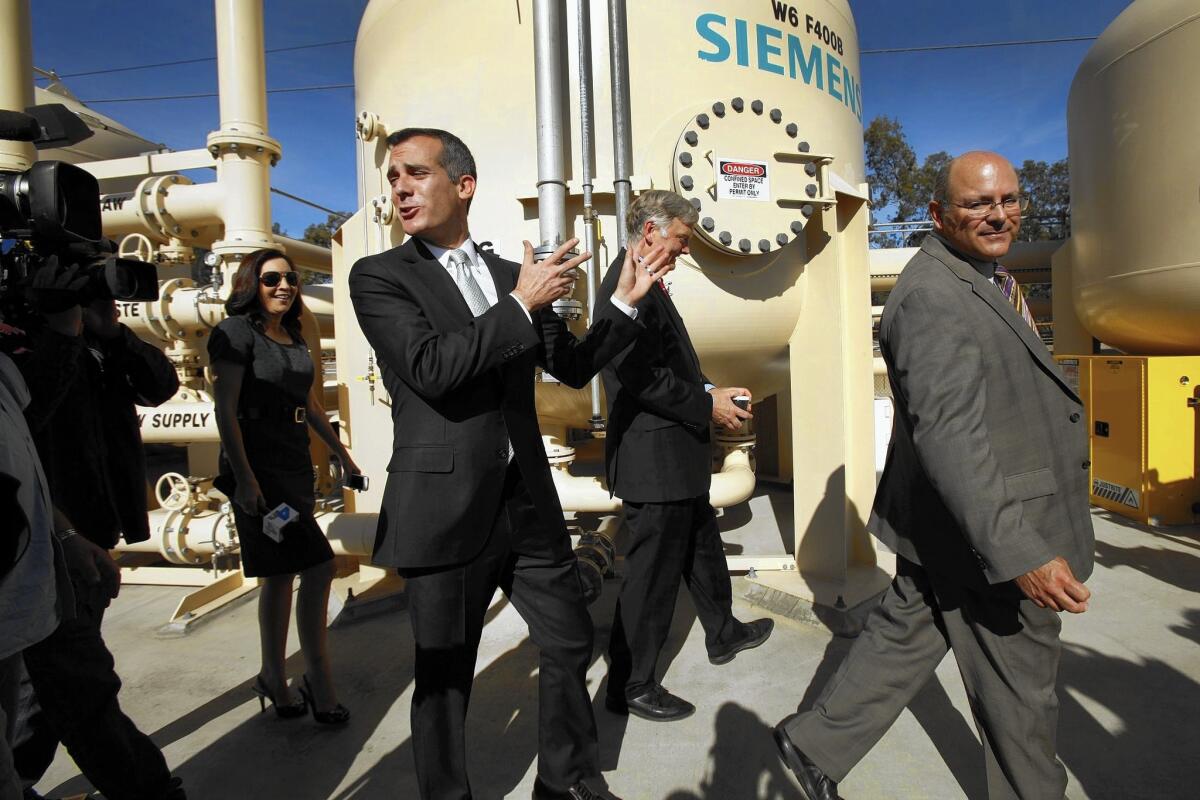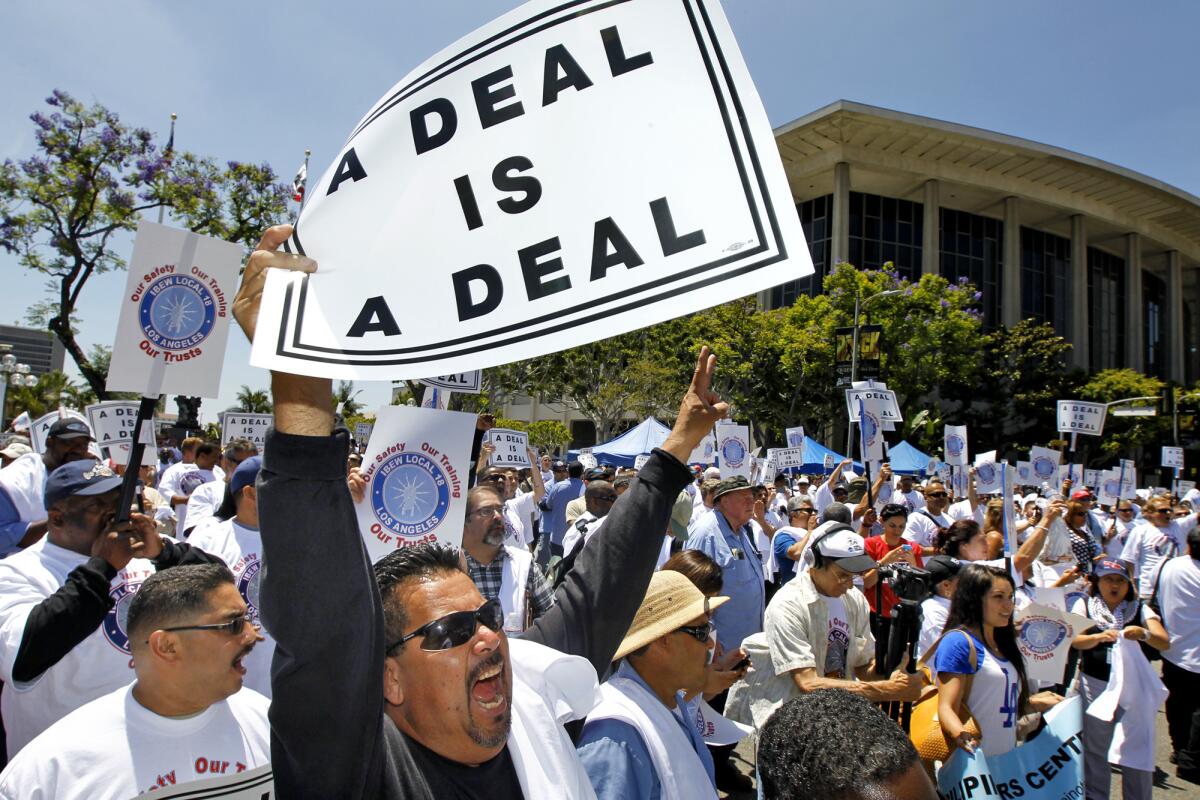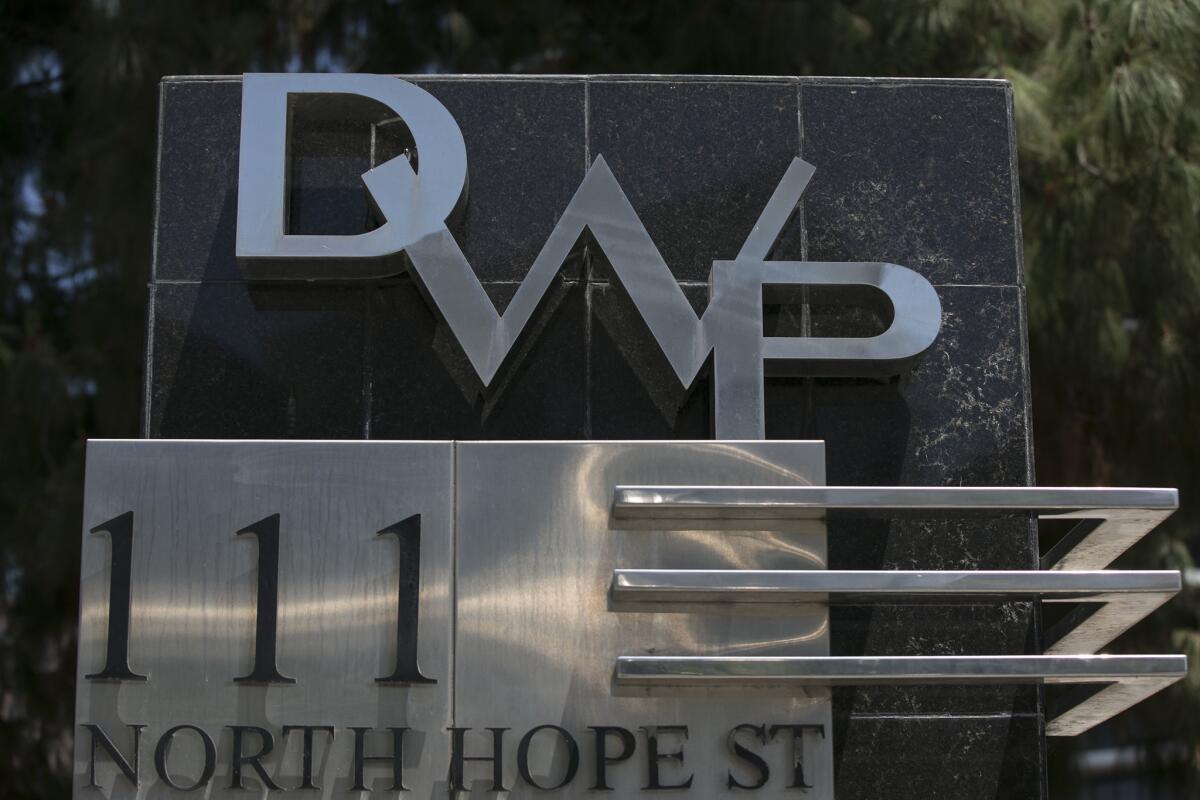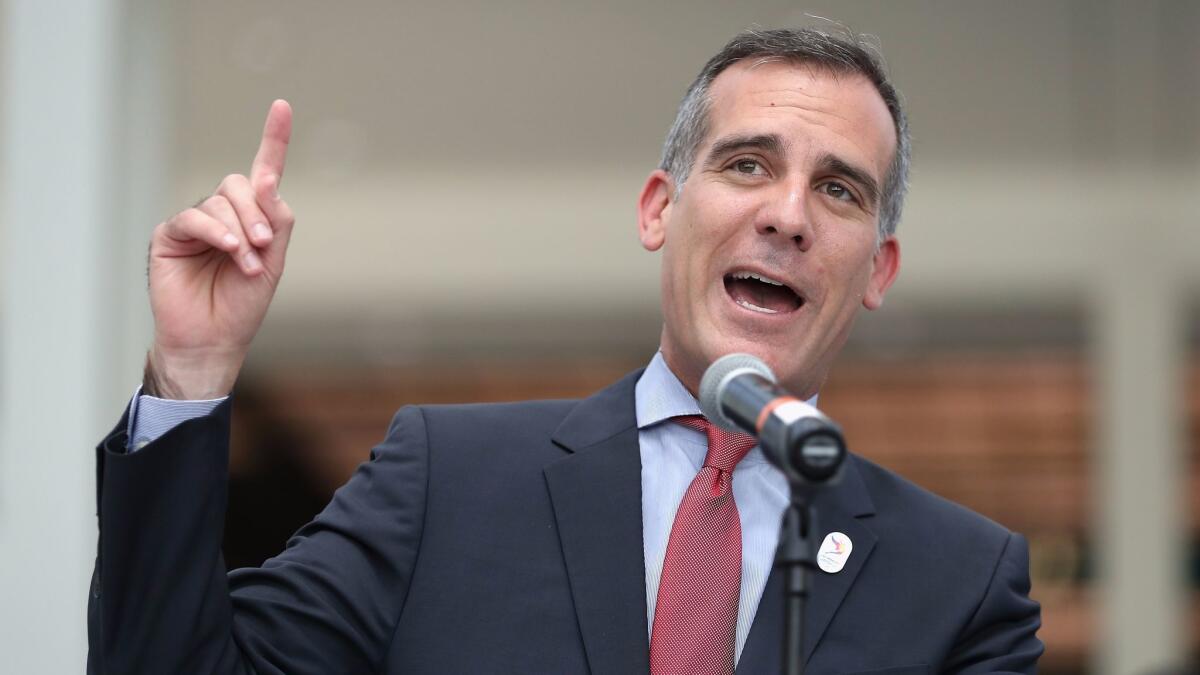Column: With millions set to lose Obamacare, DWP workers keep getting a sweeter deal

- Share via
Two news items jumped out at me in the last several days.
Item one: The U.S. Senate, after conducting its business behind closed doors, burped up a healthcare reform package that is likely to throw millions of people off the health insurance rolls.
Item two: The Los Angeles Department of Water and Power announced a contract agreement that offers free healthcare for members of the utility’s biggest union, and it’s being rushed to a vote without much chance for public input.
Both deals are subject to review. The U.S. Senate has to vote on healthcare reform, and the L.A. City Council is scheduled to vote on the DWP contract Wednesday.
So why the feast or famine? Why no healthcare for some, but free healthcare if you happen to work for the DWP?

Extremes from both Republicans and Democrats
The short answer is politics. Congressional Republicans and President Trump are fixed on firebombing Obamacare, both the good and bad of it, throwing the frail and elderly and poor off the rolls while handing tax breaks to wealthy individuals and medical companies.
Shamelessly evil? Yes. A total obliteration of Trump’s repeated promises to deliver cheaper, better healthcare for all, no sweat? Obviously.
But in Democrat-led Los Angeles, we have the opposite extreme, as our very own shell game plays out. If Republicans steal your health insurance in the near future, my advice is that you apply for a job at the DWP. Or maybe at City Hall, where the vast majority of employees still pay little or nothing for health insurance despite promises from Mayor Eric Garcetti and others to wrestle contributions out of them.
Garcetti was elected mayor in 2013 despite being targeted for defeat by the DWP’s biggest union and its two-fisted bruiser of a boss, Brian D’Arcy. So Garcetti punched back, stalling a contract agreement with the International Brotherhood of Electrical Workers Local 18 and waging a public fight for a better deal.
Garcetti notched a couple of wins, sticking IBEW with three years of no raises followed by a 2% jump. But on healthcare contributions, the mayor swung and missed.
“This isn’t the last move we can have on these issues,” Garcetti said at the time. “There is an ability for us to adjust healthcare costs.”
Well, here we are four years later. Where’s the adjustment, and where’s the public fight to win it?
Garcetti did score a couple of concessions in this contract. He got mandatory annual performance reviews of employees, and he put the kibosh on annual DWP contributions of $4 million to two “training” institutes that don’t appear to have been much more than cookie jars for the union.
Employees get more, DWP ratepayers get the bill
But on healthcare, DWP employees got another pass, and ratepayers will keep picking up the tab.
The deal, backed by Garcetti’s appointees to the DWP board, also offers six raises by 2021. Some employees will get a 22% pay hike, depending on certain variables, even as wages remain flat through much of the private sector.
In the story by my colleagues David Zahniser and Dakota Smith, DWP General Manager David Wright said that in the case of linemen, raises were necessary to keep them from leaving for better-paying utilities.
Was my memory as fuzzy as a cheap sweater? I thought we’d reported that DWP employees make far more than their counterparts at City Hall and more than their counterparts at other utilities.
So I checked with Fred Pickel of the city’s Office of Public Accountability, and he referred me to a report by a consulting firm that compared DWP pay and benefits with compensation packages at other utilities.
To summarize, DWP salaries are at roughly the median, retirement benefits are lower than median because a less generous package was negotiated for new employees, and medical benefits are the best. The average total compensation ($99,500 salary, $14,500 retirement costs and $22,100 medical and other benefits) is $136,100, which is near the median in the utility industry.

‘This is a horrible game’
But even if DWP employees are no longer tops in some categories, it’s not as if they’re underpaid.
Jay Handal, co-chair of Neighborhood Council Budget Advocates, said he thinks Garcetti is making nice with unions to win their support if and when he runs for higher office. And Handal said the DWP contract sets up the mayor and City Council for similar demands from other municipal employee unions in the midst of a projected budget deficit of more than $200 million.
“This is a horrible game, and we are the pawns in it,” Handal said. “Come on, don’t you feel the footsteps on your back as Garcetti is climbing to the next level? Those are cleats he’s wearing. Those aren’t sneakers.”
Garcetti was traveling Friday, but his deputy chief of staff, Matt Szabo, said IBEW made clear it was willing to strike over healthcare contributions. He said neither side gets everything it wants in labor negotiations. But the city got some of what it was after, Szabo said, as has been the case with other contract negotiations in which Garcetti took concessions on pensions or pay in lieu of healthcare contributions.
Wright, the DWP general manager, told me about half of the last 50 linemen to complete four years of training — at a cost of about $500,000 each in compensation — left the DWP to go to Southern California Edison Co. He said the trainees said they could make more money at Edison, with signing bonuses and unlimited overtime at double pay.
The math doesn’t quite add up
So maybe the bump in pay and free healthcare is the best way to hold on to those employees. But DWP has only 400-plus linemen, which leaves another 8,500 employees who aren’t leaving for better deals.
So why didn’t the agency hold out for health insurance contributions from them? In the private sector, employees typically chip in 30% or so of the cost of healthcare. Couldn’t DWP get a measly 10% out of its employees? Maybe 5%? Something? Anything?
“We couldn’t get IBEW to move on healthcare, period,” Wright said. “It was a nonstarter.”
Geez, who’s running this city?
I asked Wright why DWP didn’t throw it back at IBEW and tell the union that zero contribution was a nonstarter.
It was clear the union wouldn’t budge, Wright said, and Garcetti was on board with moving forward without that concession.
So what would Wright tell ratepayers who want to know why, even as their own access to healthcare might be jeopardized or their costs might surge, they’re paying for DWP employees to get free care?
“Our rates remain some of the lowest in Southern California,” Wright said of the utility, which is coming out of a years-long debacle involving the improper billing of thousands of customers, even as rates have risen. “That’s what our customers want most is low rates, and we’re delivering.”

A call to action
Rather than let Wright speak for you, I suggest you drop a line to your City Council representative or the mayor, or visit City Hall on Wednesday when the council is scheduled to take up the contract.
Before they vote, they owe you nothing less than a chance to speak up.
Get more of Steve Lopez’s work and follow him on Twitter @LATstevelopez
ALSO
Opinion: He ran as a ratepayer advocate. Now Mayor Garcetti wants to give DWP workers big raises.
DWP contract could spark costly demands from other city unions
More to Read
Sign up for Essential California
The most important California stories and recommendations in your inbox every morning.
You may occasionally receive promotional content from the Los Angeles Times.











